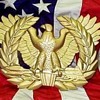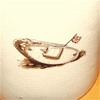Posted 13 years ago
 Chrisnp
Chrisnp
(310 items)
Today I’m posting my WWI Iron Crosses. Although I’ve spread these out over two postings, I grouped them all together in the first shot for no other reason than I thought they looked cool all together.
The front of the crosses bear the crown and W for Kaiser Wilhelm, and the date 1914 at the bottom of the Iron Cross indicates the date the cross was re-instituted (5 August 1914) The Iron Cross was first instituted in 1813, as marked on the back of the second class cross, along with a splay of oak leaves in the center and the crown and royal cypher of Friedrich Wilhelm, who reigned at the time.
During WWI there were three classes of Iron Cross and one star: Second Class (millions awarded); First Class (about 218,000 awarded); grand cross (exactly five awarded); star to the grand cross (one awarded). So, the reality for a poor WWI collector like me is that I’ll only own a first and second class.
Picture 2 is the Iron Cross Second Class (Eisernes Kreuz 2. Klasse, or EK2 or EKII). It has a maker mark “D-W” on the suspension ring. This is the usual place to find makers marks on the EKII. It appears to be the traditional construction: a two piece silver frame surrounding an iron core. At least the frame tarnishes like silver and the core is magnetic.
Pictures 3 & 4 are the Iron Cross 1st Class. (Eisernes Kreuz 1. Klasse, EK1, EKI). It is definitely a two piece frame with magnetic core. (The frame is beginning to separate around the upper edge) This example is slightly domed, others are flat. In the center of the back is a mark indicating 800 silver content (80% pure silver). Silver marks for Iron Crosses are often 800 or sometimes 900. 925 is the standard for Sterling Silver. Some yellow appears in the last photo. That’s a trick of the lighting. It’s silver tarnish.



















Many years ago when I was a young collector in Milwaukee I ran into an old Geman WWI veteran who was looking to reconstruct his WWI medals group. The originals were left with his parents in Eastern Germany before WII when he came to America. The medals were lost to the Russans in WWI. He wanted to buy the Iron Cross 1st class that I listed for sale until he saw it. Mine was the curved or convex version but he only wanted the flat vesion because the flat version is the only type actually awarded by the government and the convex versions are all private purchase wearing or replacement copies. I sure miss having the old veterans around.
Yes, it makes sense that the flat ones were the standard issue. There is a lot of variety in the EKI. My very first one was convex with two small holes in each corner for sewing to the uniform jacket (I bought it in Germany and mailed it home through the Army postal system - it never arrived) I've also seen EKI with screw post and nut backings, and there is a variety called "Prinzen" which are smaller versions of Iron Cross. I've read some German Navy personnel bought Iron Crosses in painted brass because they were more resistant to salt air corrosion.
Yes you are righ on the mark Chris. The Prinzen size I would guess is a glorifed miniature which started with the children of the royalty being awarded orders in reduced size in scale with the child's size. The unoffical navy version in brass is very scarce too. Ever notice that the original WWI wound badges are struck in iron and the post war copies are in brass or bronze?
I waited to get home before responding, so I could take a look at mine. I had assumed mine was steel because it was hollow and die-struck, but I guess I don't know enough about metalurgy to be sure it's not iron. It "clunks" rather than "rings" when droppped from about an inch. It's certainly not brass or bronze.
The WWI wound badge, I mean
The iron would be magnetic and the brass would not. Use a soft magnet like the kind that are used on most refridgerators so it does not damage the finish.
Oh, it's definately magnetic, and I know it's not brass or bronze because enough of the black is worn away on the high points to see the metal. I just don't know if it's iron or steel.
My Nimmergut books list the magnetic versions as iron which makes sense since it would be easier to produce than steel and values them at about twice the price of the bronze and brass types. Another problem with these is that the brass versions often loose their black finish and are mistaken for the gold class.
Magnificent medals, and wonderful account and discussion!!!
Thanks miKKo
Enjoyed the discussion guys & learned a lot.